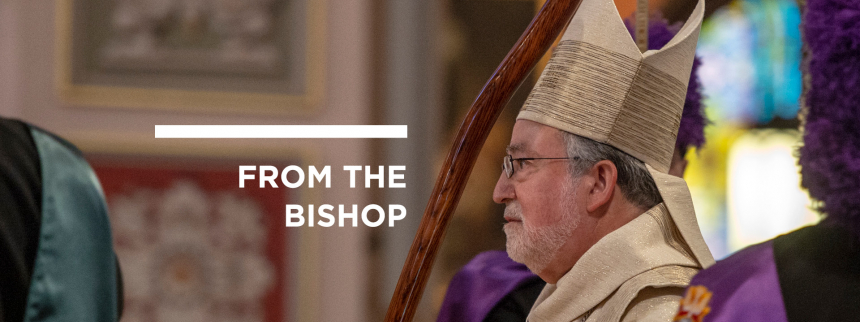
In the Gospel of Matthew, a Roman Centurion implored Jesus to heal his ailing servant (Mt 8:5-13). Without hesitation, Jesus said he would go to the house immediately and cure him. To this divine overture the Centurion responded, “Lord, I am not worthy to have you enter under my roof; only say the word and my servant will be healed.” These words have echoed through the centuries on the lips of all those approaching the holy Eucharist.
In the Gospel story, the Centurion went on to explain his hesitancy. As a Roman, a foreigner, he was considered impure by the Jewish inhabitants. He could not ask Jesus to come to his house. As a military officer, though, he understood the power to command. He trusted in the divine power of Jesus’ word to command healing for his servant.
Jesus was amazed by the faith found in the hardened Roman soldier. He did indeed command the healing of the Centurion’s servant at that very hour.
The Centurion’s eloquent expression of faith has been honored by the imitation of countless Catholics in the Eucharistic ritual for Communion.
The rite of Communion is filled with other scriptural references that guide the hearts and minds of the faithful to approach the sacred mystery of the Lord’s sacramental presence under the appearance of bread and wine. The priest holds up the body and blood of Christ, then repeating the ancient words of John the Baptist, declares to the assembly, “Behold the Lamb of God. Behold him who takes away the sins of the world.” (Jn 1:29) He then employs the eschatological text from the Book of Revelation to invite the faithful to the heavenly wedding feast of the Lamb, “Blessed are those called to the Supper of the Lamb.” (Rev 19:9)
The mind and heart are awakened to the unfathomable mystery raised before the assembly. The Divine Presence transcends its humble appearance as well the feeble limits of the senses. The eyes of faith cooperate with the Holy Spirit as we simultaneously witness the Lord Jesus in the upper room of the Last Supper, on the hill of Calvary, and seated on the throne of the heavenly feast. Time becomes part of eternity and the Lamb of God fixes his gaze upon us.
This is the sacramental epiphany to which the assembly responds, “Lord, I am not worthy that you should enter under my roof; but only say the word and my soul shall be healed.” The Mass is a living Gospel narrative in which we participate. The Lord comes to us. He is the Incarnate Word that mercifully commands to dwell within us and heal our sin-sick soul. The trusting words of the Centurion, inspired by the Holy Spirit, now inspire us and dispose us to communion with the Lord. His words teach us the humble hospitality that welcomes the unmerited moment of the Lord knocking at the door of our hearts. (Rev 3:20)
Pope Benedict XVI called the Eucharist the Sacrament of Charity. Jesus approaches us with merciful charity that flowed from his pierced side. The more one contemplates the wondrous love revealed by the Sacred Heart of Christ, the words of the Centurion become more one’s own: “Lord, I am not worthy to have you enter under my roof.” Both in the Gospel story of the Centurion as well as in the Eucharistic Mystery, the usual understanding of hospitality becomes paradoxical. Jesus made himself poor, even to the point of death, so that we may be enriched by the treasure of his mercy. (II Cor 8:9) Like the Centurion, we are aware of our poverty. Our hospitality comes from an aching hunger for the crucified Christ who said, “I am the bread of life; whoever comes to me will never hunger, and whoever believes in me will never thirst.” (Jn 6:35)
Upon the cross, Jesus cried aloud, “I thirst.” (Jn 19:28) He thirsted for our salvation and satisfied our thirst with the offering of his own blood. This was foreshadowed in the Gospel of John when a tired, thirsty Jesus asked the Samaritan woman for water. Jesus’ humble circumstances became the opportunity for the woman to offer Jesus hospitality, drawing water from the ancient well of Jacob. Through their conversation, the woman would draw the water of salvation from the divine words of the weary traveler. Jesus said to her, “Everyone who drinks this water will be thirsty again; but whoever drinks the water I shall give will never thirst; the water I shall give will become in him a spring of water welling up to eternal life.” (Jn 4:13-14)
Under the humble circumstances of bread and wine, Jesus awaits our humble hospitality so that he can nourish the hungry heart and satisfy the thirsty spirit. Each time we approach the Lamb of God in holy Communion is an opportunity to grow in humility and learn the true nature of Christian hospitality.
Benedictine monks are instructed by the Rule of St. Benedict to welcome visitors as one would welcome Christ. This old monastic wisdom helps us discover a helpful and holy synergy between our reception of holy Communion and the exercise of Christian hospitality. We are always preparing to receive the Lord Jesus with humility and gratitude. We would do well to ask the Lord Jesus in the Blessed Sacrament to teach us to imitate his humility so that we may better receive his divine charity both from his most holy body and blood as well as the neighbor or stranger who comes to our door.

